

Radical democracy, research, education in times of crisis and protests. Return to Enquiry Learning Home Page Return to Politics Return to research issues Return to educational issues Cultural issues Philosophy issues.
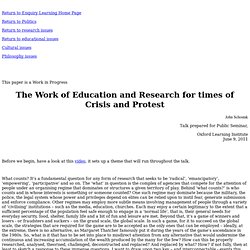
Triple crunch and the politics of educational technology. Last week Joss Winn reminded me of the urgency of the work that he and I have been doing in the last year around resilience, tied to the impacts of liquid fuel availability/costs, peak oil, climate change and the treadmill logic of capitalism.
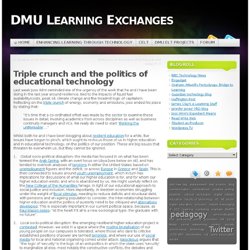
Reflecting on the triple crunch of energy, economy and emissions, Joss ended his piece by stating that: “It’s time that a co-ordinated effort was made by the sector to examine these issues in detail, involving academics from across disciplines as well as business continuity managers and VCs. Conole dehub paper_april. What are universities for (September 2008).pdf (application/pdf Object) Why even pragmatists should support the protestors on #26march - followersoftheapocalyp.se. These are my views and not those of my employer, or of projects and programmes I am responsible for.
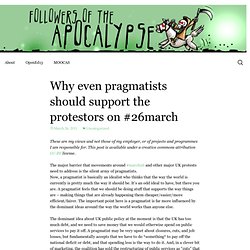
This post is available under a creative commons attribution CC-BY license. D'oh! State of anxiety as coalition realises fees sums don't add up. Universities' intention to charge £9,000 fees has undermined the government's plans.
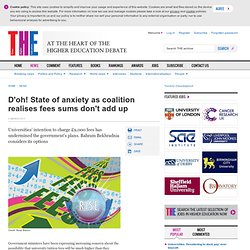
Bahram Bekhradnia considers its options Government ministers have been expressing increasing concern about the possibility that university tuition fees will be much higher than they expected. Most recently, David Willetts, the universities and science minister, stated that institutions charging £9,000 a year may look "silly". Intro. Contents Introduction xix.

Will Higher Education Split? (Sir John Daniel & Stamenka Uvalić-Trumbić) Sir John Daniel, President and Chief Executive Officer; Stamenka Uvalić-Trumbić, Chief, Higher Education Section, UNESCO Doing research for a book on the new dynamics for the development of higher education in the poorer countries that are home to the large majority of the next generation of students is leading us to an interesting question.
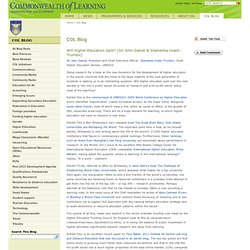
Will higher education split over the next decade or two into a public sector focussed on research and a for-profit sector doing most of the teaching? Exhibit One is the communiqué of UNESCO's 2009 World Conference on Higher Education which identified 'massification' (vastly increased access) as the major trend, alongside seven other trends, most of which have a link, either as cause or effect, to the growth of ODL, especially eLearning. There will be a huge demand for teaching, to which higher education will need to respond in new ways. Exhibit Five is Archibald and Feldman's book Why does College Cost so Much? BBC Jody McIntyre interview. NICK CLEGG RAPS - Another Prick In Whitehall (by Dan Bull) Alfie Meadows Seriously Injured - Police Watchdog IPCC to Investigate Truncheon Blow [ITNnews]
EMA fury gains pace amid fears of student drop-out - News - TES Connect. Last Updated:10 December, 2010Section:FE news Principals say loss of weekly allowance will lead the poorest to abandon courses and prevent others from entering further education altogether.

University For Strategic Optimism. New reading test for six-year-olds spelt out. 22 November 2010Last updated at 09:43 By Angela Harrison Education correspondent, BBC News Continue reading the main story Literacy levels among seven-year-olds are slightly up on last year Ministers have given more details of plans to bring in reading tests for six-year-olds in England.

Academic fury over order to study the big society. Academics will study the "big society" as a priority, following a deal with the government to secure funding from cuts.
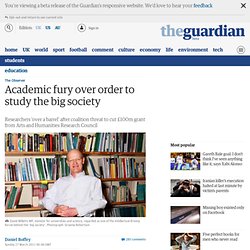
The Arts and Humanities Research Council (AHRC) will spend a "significant" amount of its funding on the prime minister's vision for the country, after a government "clarification" of the Haldane principle – a convention that for 90 years has protected the right of academics to decide where research funds should be spent. Under the revised principle, research bodies must work to the government's national objectives, although the Department for Business, Innovation and Skills said that ministers will not meddle in individual projects. Tony Horne column, November 26 2010 - Tony Horne - Entertainment. Support The Occupations! Campaign for the Public University. Why cuts are the wrong cure. Jamie Potter. Climbdown on public bodies' jobs - PCS Comment.
The death of the university? - a video for #cetis10 - dkernohan's posterous. Student protests against tuition fees « Jamie Potter. Violence can’t be dealt against property, only people*. Inside the Parliament Square riot. There is blood on my face, but not all of it is mine.
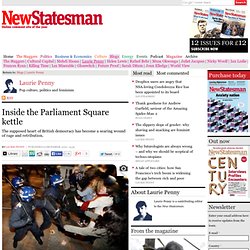
I'm writing this from the UCL occupation, where injured students and schoolchildren keep drifting in in ones and twos, dazed and bruised, looking for medical attention and a safe space to sit down. It's a little like a field hospital, apart from the people checking Twitter for updates on the demonstration I've just returned from, where 30,000 young people marched to Whitehall, got stopped, and surged through police lines into Parliament Square. They came to protest against the tuition fees bill that was hauled through the House yesterday by a fractured and divided coalition government. They believe that parliamentary democracy has failed them, that the state has set its face against them. When they arrived at Parliament Square, they found themselves facing a solid wall of metal cages guarded by armed police.
Jhn brssndn! A shocking day, alright. LRB · Stefan Collini · Browne’s Gamble. Much of the initial response to the Browne Report seems to have missed the point. Its proposals have been discussed almost entirely in terms of ‘a rise in fees’. Analysis has largely concentrated on the amount graduates might pay and on which social groups may gain or lose by comparison with the present system.
In other words, the discussion has focused narrowly on the potential financial implications for the individual student, and here it should be recognised that some of the details of Browne’s proposed system of graduate contributions to the cost of fees are, if his premises are granted, an improvement on the present patchwork arrangements. But the report proposes a far, far more fundamental change to the way universities are financed than is suggested by this concentration on income thresholds and repayment rates.
Education news, resources and universit. Free Agents in UK: Militant Optimists and Positive Disruptors. The Really Open University. Universities, higher learning and resilient education. Over the weekend, I attended “ For People and Planet : Not Profit and Self-Destruction: Can Universities make the move towards, or even lead ‘transition’?” What follows are the questions that it raised for me. I have also included a few unattributed quotes. Sustainability : Nothing is sustainable. Can the University as a physical form be sustainable?